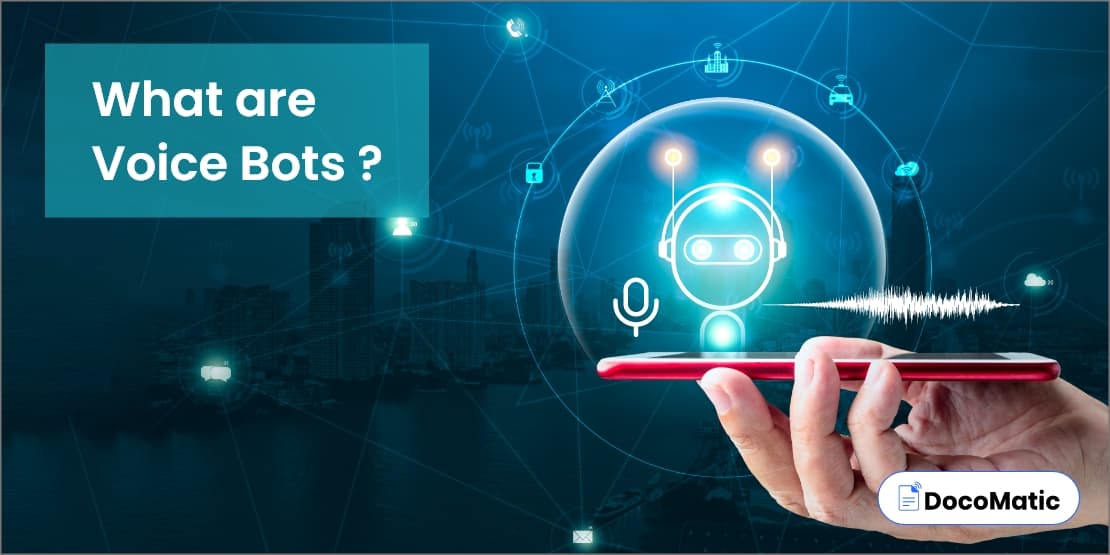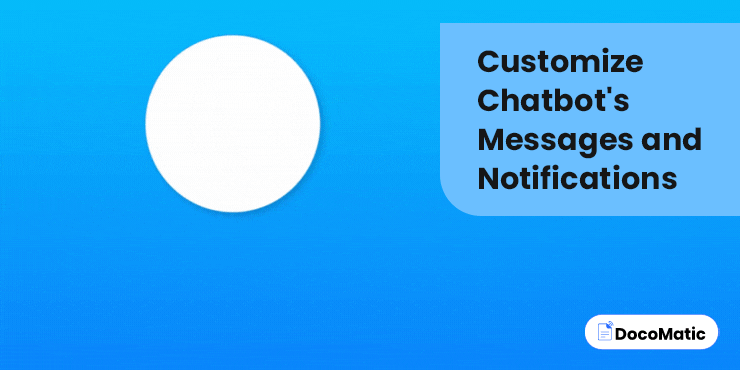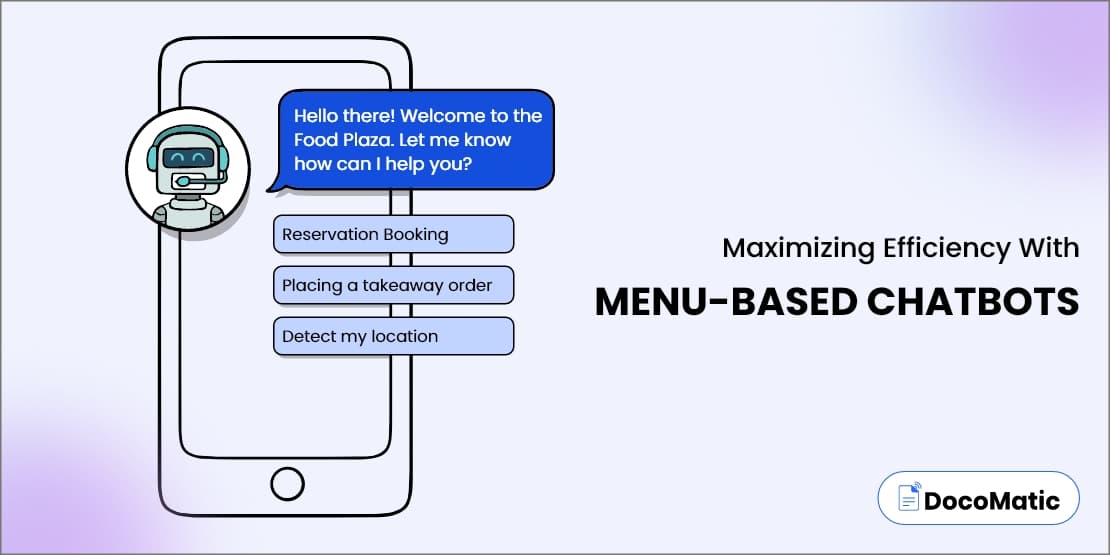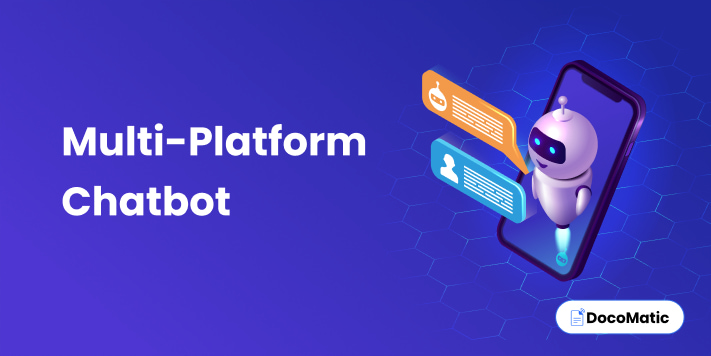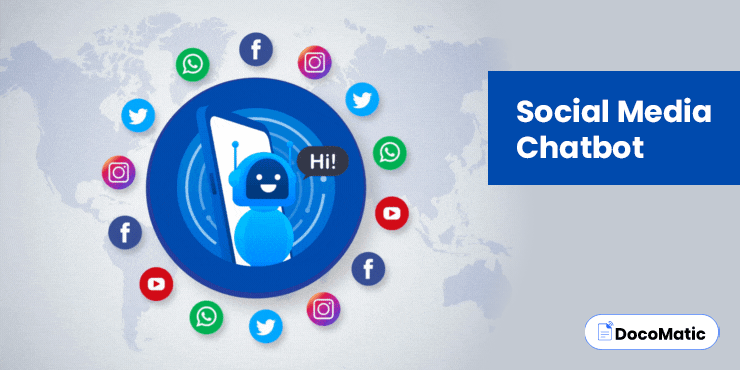In today’s fast-paced and ever-evolving marketplace, businesses must use the latest technology to stay competitive. And that’s where Chatbots come in.
Chatbots are automated programs that engage with clients via chatting services like Facebook Messenger, WhatsApp, or your own website. They are built to perform a wide range of tasks, from processing payments and orders to providing responses to commonly asked queries.
The market size of Chatbots is expected to reach $9.4 billion by 2024. Chatbots aim to deliver a fantastic experience by utilizing the power of artificial intelligence, machine learning, and natural language processing.
Businesses use Chatbots to expand their customer base, generate more quality leads, and automate customer service. Through this guide, we will cover everything about Chatbots for business that is from fundamentals to best practices. So let’s get started and explore the limitless potential of chatbots for your business!
Table of Content
What is a Chatbot?
Chatbot is a computer program that relies on artificial intelligence. Chatbot is designed to resolve customer queries around the clock over the internet. They assist various sectors, from banking and finance to health and wellness. As a result, the Chatbot ecosystem is quickly expanding to stimulate human conversations by understanding the customer intent. Overall, businesses have the opportunity to improve their systems and deliver outstanding customer service to remain competitive.
However, with the emergence of AI chatbots, businesses can now elevate customer service by integrating cutting-edge technology like natural language processing and machine learning. By now, you have an idea of a Chatbot; let’s explore the types of Chatbots available and how they may be utilized to improve the customer experience.
Types of Chatbots That Will Improve Your Business Processes
Here are some common types of chatbots that will help you to improve your business processes in no time.
1. Rule-based Chatbot, which depends on pre-defined rules to answer customer questions. They can respond only to the questions that are programmed into them. Typically, they match pre-defined responses to keywords from consumer queries. These Chatbots are perfect for simple customer support or straightforward inquiries.
2. AI-powered Chatbots use natural and machine language to understand queries and provide personalized responses. They analyze customer data to learn about their preferences, actions, and intentions. Complex client inquiries and personalized recommendations are all made possible by AI-powered chatbots.
3. Hybrid Chatbots combine Rule-based and AI-powered Chatbots, which helps deliver a more sophisticated customer experience. They apply pre-defined guidelines for simple consumer inquiries; however, they can switch to AI-powered answers for more complicated inquiries. This makes it possible to deliver more personalized responses to improve the client experience.
4. Voice Chatbots are the ones that interact with customers using speech recognition technology. They use natural language processing (NLP) to understand user speech and react accordingly. Voice Chatbots are perfect for hands-free customer interactions, such as driving or cooking.
5. Social media Chatbots are computer programs using AI to interact with users through platforms like Facebook, Twitter, and Instagram. They are designed to replicate human conversation for the frequently asked questions.
To know more about GPT-enabled social media chatbot like how it is useful to your business, then you can refer to this use on social media chatbot for businesses.
Knowing the types of Chatbots, you might wonder what the best practices for using chatbots for your business are.
Best Practices of Using Chatbots for Business
Every business can be benefited from using Chatbots, but in order to improve effectiveness, some best practices must be followed. Following are some of the best practices for adopting chatbots:
Do’s of Using Chatbots
- Setting goals and objectives is crucial because understanding your objectives will enable you to design a chatbot specifically for your company’s requirements.
- Ensure that the user interface of your chatbot is simple to navigate and use, thus helpful in guiding consumers through the conversation.
- Making your chatbot more engaging and helpful requires personalization. For example- Use the customer’s name and provide personalized answers depending on the client’s behavior and preferences.
- The use of natural language processing (NLP) can improve how well your chatbot comprehends and handles user requests. The implementation of NLP can enhance user experience and increase the effectiveness of chatbots.
- Regularly test your chatbot, then make changes depending on user feedback. This will enable you to spot potential areas for improvement and guarantee that your chatbot is consistently meeting customer needs.
- To give users a seamless experience, integrate your chatbot with other systems, such as your customer relationship management (CRM) system or website.
Don’ts of Using Chatbots
- Don’t make your chatbot too complicated or difficult to be utilized by the users.
- Although AI is crucial for chatbots, it’s also essential to balance automation with human interaction. Don’t rely on AI too much because that can make consumers’ experiences impersonal and frustrating.
- To keep performing at their best, chatbots require constant maintenance and updates. Failure to perform routine maintenance and updates may result in errors and malfunctions that could damage the reputation of your company.
- It is advisable to use human interaction instead of chatbots when dealing with private information or delicate situations like sophisticated customer care issues.
- Although chatbots are powerful tools, they do have some drawbacks. So, do not completely rely on them to solve all of your business problems.
By following the above practices, Chatbots can prove efficient for your business. Going ahead, let us find out how Chatbots are beneficial for your business.
How is Chatbot Beneficial for Business?
Chatbots have emerged as a game-changer for businesses aiming to increase consumer interaction, cut operational expenses, and improve overall performance. Below are some of the benefits that chatbots offer to businesses:
1. 24/7 customer support
Chatbots have become a game-changing technology for providing round-the-clock customer support without human intervention. Plus, customers may have queries even after business hours, and failing to get solutions can lead to dissatisfaction. This is why Chatbots are being introduced to provide instant customer support 24/7 on their websites.
One of the main benefits of Chatbots is that they can support multiple website visitors simultaneously. Overall, the 24/7 customer support chatbot provides quick and personalized answers to customer queries, leading to higher customer satisfaction and retention.
2. Cost savings
Chatbots can help businesses save money and increase profitability. The most common way to save money is to have a chatbot handle simple customer inquiries without human agents, thereby lowering the cost of the support team. It can also save costs by reducing the need for physical infrastructure like office space, equipment, or other resources.
On the other hand, it can improve operational efficiency by quickly gathering necessary details and providing relevant information. Thus, incorporating Chatbots into business operations can lead to significant cost savings.
3. Increased productivity
Chatbots can handle multiple tasks and streamline processes, thus providing extra time to employees. For example, it can handle frequently asked questions or support tickets, allowing agents to focus on more complex queries like technical support.
Further, employees can focus on increasing customer satisfaction or developing new business strategies by automating time-consuming tasks. This can lead to increased productivity, higher customer satisfaction rates and ultimately, growth of the business.
4. Personalized customer experience
In the competitive market, a personalized customer experience is significant. Chatbots understand the customer’s behavior and preferences using AI and machine learning. For example- a Chatbot for a fashion brand can suggest items to the customer based on their browsing behavior or their interests.
This helps them to provide customized recommendations or promotions to existing customers. A personalized experience can make a customer feel valued and important and can also result in higher customer satisfaction, engagement and revenue.
5. Generate leads
Businesses can save time and resources spent on traditional marketing campaigns. Chatbots can provide the right information to the right audience, making it easier to get quality leads and generate conversions.
Chatbots are programmed to ask relevant questions to build trust with potential customers. This is why Chatbots can be a valuable tool for generating leads, improving customer engagement, and saving time and resources.
6. Boosts customer engagement
Customer engagement can be boosted by providing convenient and responsive communication channels. With Chatbots in place, customers can interact with customer service reps to get instant responses and get issues resolved in real-time.
Chatbots can learn customer preferences and deliver a personalized experience to keep the customer engaged. This is how Chatbots can help businesses by providing personalized responses and boost customer engagement.
7. Align human touch with automation
To create a seamless Chatbot experience, it is crucial to align the human touch with automation. Though Chatbots can automatically handle customer queries, human intervention is still needed. Chatbots can be designed to trigger escalations to the human agent for complex queries automatically.
Additionally, businesses can also introduce a customer feedback mechanism. This will help identify the areas where Chatbot or human agents need improvement to offer better services. It will help businesses to enhance customer experience and revenue by aligning human touch and automation.
8. Competitive advantage
Gaining a competitive advantage is essential for any business to survive and thrive. With advancing technology, companies should innovate to stay ahead of the competition. A Chatbot can help you differentiate your brand by providing a unique customer experience.
Chatbots that provide instant responses to customer queries can gain a competitive edge by providing faster and better customer service. Thus, by adopting the latest technologies, you can stay ahead of the competition and succeed in the long run.
Above are some reasons to incorporate Chatbot in your business, but it’s essential to follow best practices to get the most out of them.
Top Chatbot Recommendations
Businesses are increasingly depending on chatbots to offer round-the-clock customer care and improve the consumer experience. Here are some of the top chatbot recommendations for organizations looking to increase client interaction and expand their business.
1. DocoMatic
DocoMatic is an AI based chatbot unlike ChatGPT and a personalized business specific chat assistance. Plus, it is a tool for creating and publishing software documentation.
Features:
- Automatically extracts documentation from code comments
- Establishes link between various documentation sections to facilitate navigation
- Features a strong search engine for finding information quickly.
- Offers style and branding options for personalization
2. ManyChat
The chatbot platform ManyChat helps businesses to automate their communications with clients on Facebook Messenger.
Features:
- Provides a drag-and-drop interface for simple bot construction
- Consists pre-built templates for typical usage scenarios, like lead generation and customer service
- Enables companies to gather information and insights about customer interactions
- Integrates with well-known marketing programmes like Shopify and Zapier
3. LivePerson
LivePerson is an AI-powered chatbot platform that enables companies to interact with customers via phone, video, and messaging.
Features:
- Utilizes machine learning and natural language processing to comprehend consumer inquiries and deliver customized solutions
- Provides a variety of third-party tool connections, such as Salesforce and Zendesk
- Analyzes and provides real-time monitoring of consumer interactions
- Provides support for omnichannel across various messaging platforms and social media channels.
4. Intercom
Intercom is a platform for client communications that enables companies to interact with customers through several channels.
Features:
- Offers a variety of communicating methods, such as social media, email, and chat
- Provides solutions for customer service, such as chatbots and knowledge base management
- Enables businesses to use custom workflows and rules to automate customer interactions
- Provides information and analytics on consumer interaction and behaviour
5. Drift
The conversational marketing platform Drift, helps businesses to communicate with clients in real time.
Features:
- Drift comprehends consumer inquiries and deliver customized responses
- Offers a variety of marketing services, such as customer involvement and lead generating
- Enables companies to design unique chatbots and workflows for certain use cases
- Analyzes and provides real-time monitoring of consumer interactions
Businesses and individuals may stay ahead of the curve and provide their clients the smooth, customized experiences they deserve by utilizing the power of these cutting-edge chatbots.
Future of Chatbots in Business
Since the inception of Chatbots, it has come a long way and is still evolving. Chatbots are becoming even more sophisticated with Artificial Intelligence and Machine Learning advancement.
One future development that we can expect will be personalization. Chatbots can analyze the data available to understand customer preferences and deliver a helpful response. It will help make customer interaction more effective and personalized.
The other area of development is the integration of Chatbots with other tools. Chatbots can be integrated with augmented reality and voice assistants to create a more engaging customer experience.
Overall, the future of chatbots in business is bright, and by embracing Chatbot technology, businesses can also gain a competitive advantage.
FAQs
Chatbots help businesses in many ways, including providing 24/7 customer support, reducing costs, increasing business productivity, personalizing the customer experience, generating quality leads, boosting customer engagement, aligning the human touch with automation, and gaining a competitive advantage. It also gathers valuable data and insights to help businesses make better decisions and optimize their operations.
Some of the critical benefits of Chatbots for customers include:
- Instant responses,
- Easy access,
- 24/7 support,
- Personalization.
A business Chatbot is a software program that uses artificial intelligence and natural language processing to conduct human-like customer conversations via messaging platforms. It is intended to support and automate various commercial operations, including customer support, sales, and marketing.
One can follow the steps below to create a chatbot for own business:
- Define the purpose
- Choose a Chatbot building platform
- Create a flowchart
- Write and design the script
- Integrate the Chatbot with your website
- Test and optimize the performance
Conclusion
Chatbots have the power to change how businesses run completely. By automating their business processes, companies may stay ahead of the competition by embracing game-changing technology. They are gradually adding a fresh perspective to the industry’s various divisions, including engagement, sales, marketing, and customer support.
As a result, your company needs a strategy to maximize the use of AI chatbots for lead generation, customer insights, onboarding, and scalability of customer care. It’s time to start using Chatbots for your company now that you are aware of all their wonderful advantages.


